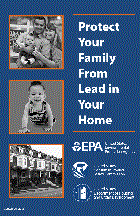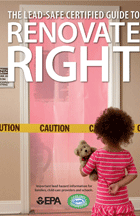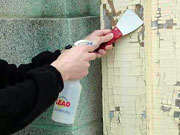Common renovation activities that disturb painted surfaces, such as sanding, scraping, cutting, and demolition can create hazardous amounts of lead dust and paint chips when disturbing lead-based paint which can be toxic to children, adults, animals and the environment.
As of April 2010, federal law requires contractors to become EPA Lead Certified Renovators. The Renovation, Repair and Painting rule (RRP) affects anyone who is paid to perform work that disturbs paint in housing and child-occupied facilities built before 1978. This includes: residential rental property, owners/managers, general contractors, maintenance personnel and trade contractors, including: HVAC, painters, plumbers, carpenters and electricians.
View EPA Federal Lead Rules for Contractors
To Become a Certified Renovator, an individual must successfully complete an 8-hour initial renovator training course and pass the hands-on skills assessment and exam, then apply to the EPA as a Certified Renovator. Renovator Initial Certifications remain current for 5 years from the date of course completion.
|
To Remain a Certified Renovator a renovator must complete a refresher training course before their current certification expires. Renovators must take a 4-hour refresher training that includes hands-on learning every other time they take the refresher course. Renovators who take the online refresher training will be certified for three years; renovators who take the hands-on training in the refresher course will be certified for five years. If the initial certification expires, the 8-hour course in its entirety must be taken again.
Individuals working under Certified Renovator’s Supervision can either be certified renovators (meaning they successfully completed the RRP training) or they can have been trained on the job by a certified renovator. Such on the job training must be documented and the documents must be retained.
Due to Covid-19, Monroe County is not offering free RRP initial or refresher classes at this time.
EPA Disclosure Information for Property Owners, Renters and Renovators
Two federal laws regarding notification and disclosure of lead information may affect you before you sell or remodel your property:
Before You Sell/Rent
Effective December 1996, as per Section 1018 of the Residential Lead Based Paint Hazard Reduction Act of 1992, sellers and landlords must disclose information on known lead-based paint and lead-based paint hazards in residential housing, and provide any available reports to prospective buyers or renters. In addition, sellers and landlords must give buyers and renters the pamphlet entitled “Protect Your Family from Lead in your Home” and keep a record of such distribution. All real estate closings should include a disclosure form as part of the transaction.
closings should include a disclosure form as part of the transaction.
Before You Renovate
Effective December 2008, as per 40 CFR Part 745 Lead; Renovation, Repair and Painting Program and Section 406(b) of the Toxic Substance Control Act, Title IV- Lead Exposure Reduction, renovators and remodelers working for compensation, are required to distribute the pamphlet “Renovate Right” to owners and occupants of most residential housing built before 1978 before commencing renovation activity. Minor housing repairs, maintenance, and emergency repairs are excluded from this notification requirement.
Additional Local Requirements
- NY Code of Rules and Regulations, Title 10, Part 67, Lead Poisoning Prevention and Control
- NYS Public Health Law, Title X, Control of Lead Poisoning, Section 1370
- Monroe County Sanitary Code, Article IV, Habitable Buildings
Informational Links
- Coalition to Prevent Lead Poisoning
- New York State Department of Health
- City of Rochester Lead Law
- Western New York Lead Poisoning Resource Center
- Lead Testing of School Drinking Water
- U.S. Dept. of Housing and Urban Development (HUD) - Lead Hazard Control
- U.S. Environmental Protection Agency (EPA) - Lead
- New York State Department of Health Renovation Guidelines
- Lead Paint Safety:Field Guide for Painting, Home Maintenance, and Renovation Work
- American Academy of Pediatrics (AAP)
- Lead Testing of School Drinking Water
Helpful Documents
- EPA Disclosure: Protect Your Family from Lead in your Home
- EPA The Lead-Safe Certified Guide to Renovate Right (PDF)
- EPA Lead Disclosure Fact Sheet
- NYS What Your Child's Blood Test Means
- Blood Lead Screening Data 2020-2024 Bar Chart
- Blood Lead Screening Data 2024
- Age of Homes in Monroe County (197k PDF)















